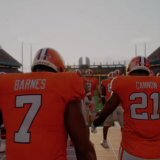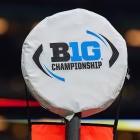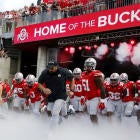
Rik Doggett has been forced to kill. It goes with job of being a Navy SEAL. Veterans of the Navy's largely covert, primary special operations force don't particularly enjoy recounting their missions to those outside of the brotherhood.
But there was this one Kevin Steele cannot forget.
If you've forgotten about Steele himself, well, he remains one of college football's top defensive minds. The 63-year-old coach had the misfortune of losing two interim head coaching jobs in 18 days this January. First at Auburn after coaching the Tigers' bowl game following Gus Malzahn's firing, then at Tennessee where security meant taking over after Jeremy Pruitt was fired … only until Josh Heupel was hired.
"To be real frank with you, I could write a book now about nothing more than those 18 days. So much so that if I did choose to write a book, it would be a Netflix series," Steele told CBS Sports.
Since his exit from the Volunteers, Steele has become college football's offseason mystery man.
For the last four decades, one of the nation's most respected defensive minds has always been coaching -- somewhere -- in professional or college football. Suddenly, Steele isn't coaching anywhere.
How he has gotten to this point in his life is fascinating.
In a recent conversation, the veteran coach quickly switched gears from his employment status. Since early March, he has been a coach without a team after not being retained by Heupel. But he'll be back. The good ones always return.
Rather, Steele recounted a previously undisclosed battle with COVID-19 and centered the conversation on his experience speaking with guys like Doggett, a 22-year veteran of the SEALs who got out with the rank of master chief in 2018.
That a 40-year coaching career is on hold is no concern for Steele, who knows it's certainly not over.
Now, he spends a large portion of his days mentoring SEALs who have transitioned out of service and helping them start new careers. Steele figures he owes it to them. They've accomplished so much more than just about any of us.
So yes, Steele's buddy killed people in defense of his country. There was this one operation when Doggett's team was pursuing a drug lord. Doggett was perched on a roof as advance man on a raid. Sensing his presence, a dog barked, spooking armed guards coming out of a house below him. Doggett shot both men then trained his sight on the dog.
"I'd already pulled the trigger a couple of times that night, but I did not want to shoot the dog," Doggett said. "He was doing his job. He was a big dog. He was a massive dog."
Steele took over the story following one of many late-night sessions he has shared with SEALs in his home.
"I couldn't pull the trigger," Steele recalled Doggett saying. "I stayed over there [out of the country] for 12 years in and out. It's the only time I've ever put my sight on something and couldn't pull the trigger. I could not kill that dog. He ain't got no weapon. He ain't trying to [kill someone]."
It's hard to relate life-and-death battlefield decisions to a football locker room, but both have inspired Steele.
Steele found this calling stemming from a relationship with noted cardiac surgeon John Richardson, an Auburn alum who once threw the discus for the Tigers. It was Richardson's work with the Eagle Fund that led to his work with SEALs.
The Eagle Fund was established about 20 years ago by Dr. James Andrews, the noted Alabama-based athletic orthopedic surgeon, and EXOS, nationally-known elite athletic training centers. It is dedicated to helping those in the Special Operations community not only recover from injuries they received in the service but ready to be deployed again.
Over 90% have gone back into service.
"What the government did for a long time was, if a SEAL or a Delta Force guy tore his ACL, they'd retire them," Richardson said. "They never really got any elite rehab like college athletes or pro athletes. Long story short, we proved to the generals we can rehab these guys and get them back whatever their injury is."
Separated by only two years, Richardson, 65, and Steele became fast friends. They had been introduced by former Auburn assistant Rodney Garner. Fan boys of select military specialists? You bet. They weren't alone. Richardson still remembers an Auburn Military Appreciation Day against Georgia a few years ago when special operations forces were honored at Jordan-Hare Stadium.
"That's one of the loudest [receptions] I've ever heard it when those guys walked back to their seats," Richardson said.
"Relatively speaking, you kind of connect with people of the same mind frame," Doggett said. "When I say that, I mean people that are at the top of their game and striving to be better. As far as college football and especially the defensive side of the ball, you can't get much better than Kevin Steele. To be very blunt about it, among the coaching staff there, Kevin was the one I really wanted to meet."
It's the little things for the warriors who have already accomplished big things in their careers. Doggett is from Bay Minette, Alabama -- near Mobile -- and has settled in Birmingham.
There is a little more to it for the coach and the surgeon than to help their fellow man. Both Steele and Richardson have made it sort of a vocation to assist a special class of servicemen cycle back to public life.
"I've sat in my house with four Navy SEALs and listened to stories. It's like going to the movies," Steele said. "One of the guys was the commander on the [Osama] Bin Laden raid. It's just a different lifestyle. I've sat for hours -- 4-5-6 six hours at a time. They don't really understand society. They don't understand the way IBM works or the way Goodyear Tire works. They don't understand the work force. They're all team oriented. They kind of relate more to athletes."
What both Richardson and Steele found was special ops types tend to downplay their roles. Former Marine special forces officer Eric Kapitulik's post-military career has included building a thriving personal development company that works across all spectrums -- from teaching military training to college teams to team-building corporate events.
In 1999, he was one of 10 survivors after seven members of his platoon died when their helicopter plunged into the ocean during a routine training exercise. Kapitulik has since dedicated his life to helping make those survivors' families financially stable.
It's the brotherhood that endures.
"In college football, there is some turnover," said Kapitulik while describing transitions out of the military. "In a special ops, they don't. Those guys are pretty much going to be with it for a career. You're not only losing what you do and are passionate about [when you retire], how many people do that in life find two things they're passionate about? It's almost impossible."
It was time for Doggett, who was deployed to more than 25 countries during his career having become a sniper instructor. He has won the Commendation Medal citing special acts of heroism. His injuries while in the service included three back surgeries, hip surgery as well as procedures on both shoulders and a bicep.
The dedication doesn't stop there. Richardson said special ops troops will frequently return from deployments with lower growth hormone and testosterone levels, the result of repeated concussions endured in explosions. Post-traumatic stress syndrome is common as well.
"These guys are over there doing that and two days later they're over here grocery shopping and going to PTA meetings. They've got a lot of issues," Richardson said.
The SEALs' end of the deal includes getting a look behind the football scenes that few of us see -- sitting in meetings, watching the game plan unfold, accessing practice, players and the program as a whole. All that has dovetailed into work in the community by the SEALs. Doggett decided to do things "that got me out of my comfort zone," speaking to corporations and children's hospitals.
"They're special dudes now," Steele said. "When you get to know them, they're all hardcore American patriots, but they're liberal ones. There is also conservative ones, all different colors, races, backgrounds. There are some that are strong in their faith. There are some that are wilder than hell. But they all get along like they're from the same mother."
To show their respect, the SEALs have awarded Steele "challenge coins". In the SEAL culture, challenge coins are typically awarded by unit commanders recognizing soldiers for their special achievement.
Steele has been humbled to receive seven of them as a civilian.
"Those are kind of reserved for people who we respect and appreciate," Doggett said.
The rewards hardly seem commensurate. A treasured, traditional military icon (a coin) in exchange for watching a practice? Steele gave one SEAL an Auburn T-shirt. In return, the warrior gave the coach an American flag that had flown over a SEAL team headquarters overseas.
The SEALs are also a reflection of us. One member with whom Steele is closest has three college degrees. Doggett was almost the opposite. In 1991, he was on his way to walk on at Gulf Coast Mississippi Community College. He had just seen his father bring home a June 1991 Newsweek magazine with a cover story proclaiming special operations forces "Secret Warriors". The intrigue and challenge wore on him. In the middle of drive, he pulled over and reshaped his life.
"On my way there, I thought, 'This isn't what I was meant to do,'" Doggett recalled. "I turned around and picked up a pay phone told my parents, 'I'm coming home. I know what I'm supposed to do.'"
The magazine cover still hangs in his basement.
While one career has ended, another is merely paused.
Out of respect for every person involved, Steele will not divulge much from that period in January. The man loves Auburn where he had been defensive coordinator for the last five years. Steele continues to live in the college town.
He might love Tennessee more. After all, it's his alma mater. Steele played linebacker for Johnny Majors in the late 1970s. Four days after Auburn hired Bryan Harsin to replace Gus Malzahn, Steele was brought in by Pruitt on Jan. 12 as a defensive assistant.
Six days after Steele joined the Vols, though, Pruitt was fired for cause amid an NCAA investigation. Steele's fate lingered for the six weeks until finally being told he would not be retained by Heupel in early March.
Before Heupel was hired, there was a period of about 24 hours when a lot of media and even Steele himself thought he would be the next Tennessee coach. Then, poof, it was gone.
Steele assembled four consecutive top-20 defenses at Auburn becoming a Broyles Award finalist (best assistant in the country) in 2017 when the Tigers beat two top-ranked teams (Alabama and Georgia) in the space of three weeks. That same year, Steele was a finalist for the Tennessee job that Pruitt eventually got.
You would expect nothing less from a process-driven coach whose career has included stops at 11 schools and one NFL franchise. He has coordinated defenses at four Southern powerhouses (Alabama, Clemson, LSU and Auburn) for a total of 11 years. He has coached under Bobby Bowden, Dabo Swinney and Nick Saban, among others, throughout his career. He was on Saban's first staff at Bama and on the last staff of both Pruitt and Malzahn before they were let go.
Steele also failed at Baylor, going 9-36 as a head coach from 1999-2002. All of it has burnished the career of a man who has been much more than has previously been revealed.
"The line I use when people ask me, what are you doing?" Steele said. "I say, 'Standing in a hallway, waiting for a door to open.'"
There is no doubt he will be back in the game. The timing just isn't right. With only one job open (Kansas) and it being April, his employment status doesn't figure to change anytime soon. That's sad for a guy whose last fall that didn't involve coaching or playing football was more than 40 years ago.
"The only thing I ask for, if the Good Lord makes me homeless, do it in warm weather because I can't stand being cold," Steele joked recently.
In many ways, he is in the prime of his career. Steele is 63 but feels 43. He hasn't eaten meat since 1989. He runs four miles per day, 340 days a year. Forget SEC coordinator, that's not exactly the health profile of your average assistant at any level.
You can imagine how that previously unreported bout with COVID-19 slowed down such an achiever. It was last July. Steele didn't see the office for 23 days as he fought the coronavirus. Few outside the Auburn bubble knew probably because it was the dead of the offseason. But this was a battle he was unprepared to fight. And it was serious.
"It was brutal. It was bad. I lost 11 pounds," Steele said. "Three days, I didn't get out bed."
Richardson made sure a nebulizer and oxygen sensor were sent to Steele's home.
"I couldn't move," Steele said. "He's one of my closest friends. I had a 102.8-degree temperature and my [blood oxygen level] had gotten down to 92. John said, 'If that hits 90, call 911."
Back then Steele had to make plans to go to the restroom like it was play on his call sheet. The few steps exhausted him. Before Steele resumed his running regime, Richardson suggested a heart exam because of COVID-19's possible impact. Within 10 days, Steele was able to begin jogging again.
Still, his malady stayed a secret. In those comparatively early days of COVID-19 -- with the decision still to be made whether the 2020 season would be played at all -- Steele wanted his personal business to stay personal.
"I don't want anybody to know I got this," he recalled, "because I don't want it to be politicized as a reason why we should or shouldn't start again."
Football made it through 2020. So did Steele … with some bumps at the end.
But he'll be back. The good ones always return.
It's a career that is altered now, perhaps forever. Football may need Kevin Steele. He may not need it as bad next time.
"It's what I do," he said of coaching. "It's not what I am. I don't have to have a title … to wake up happy in the morning."





















